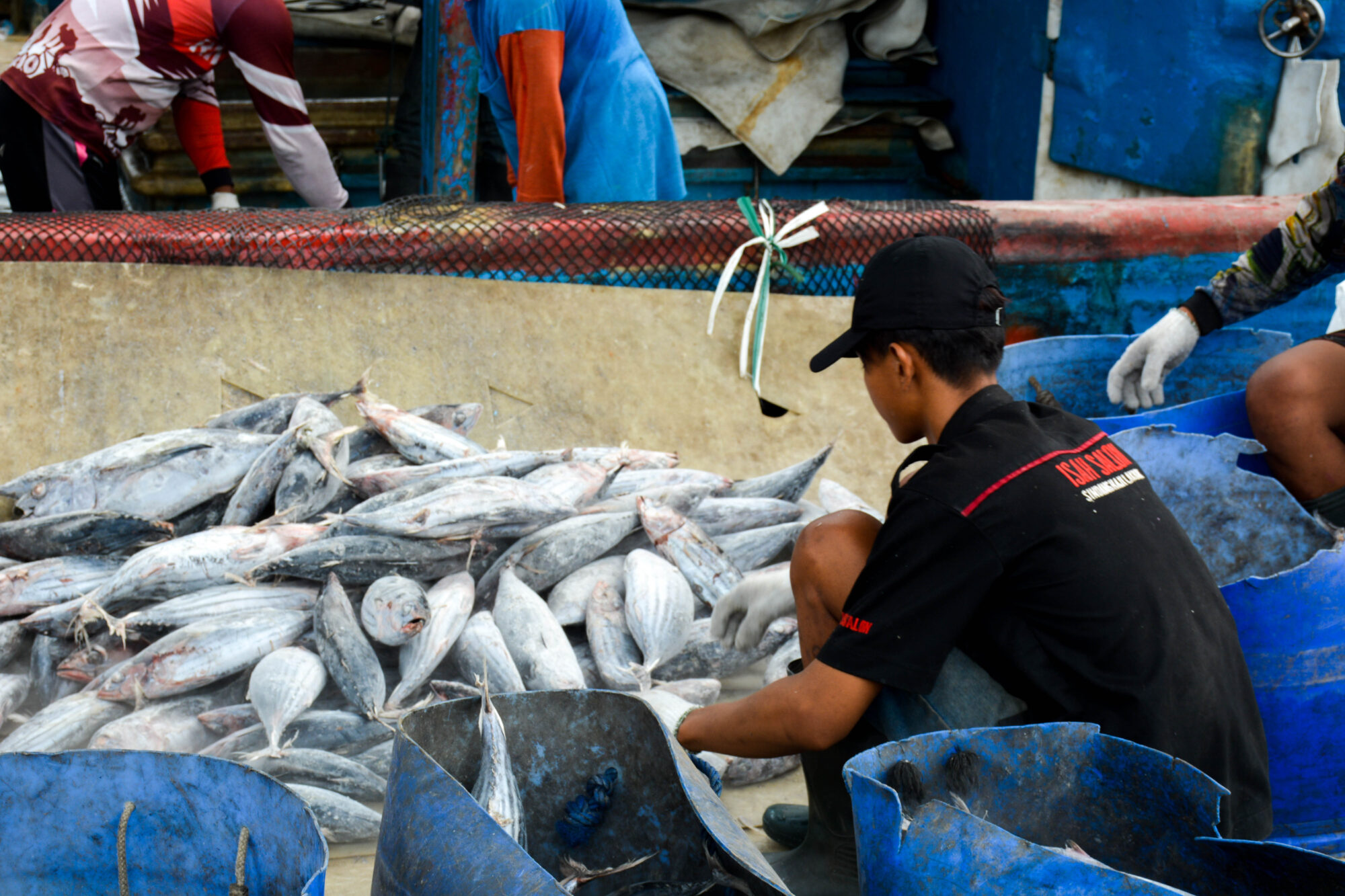
The global seafood industry has created increasing demand for the production of cheap seafood, and most nations cannot satisfy this demand via domestic fisheries alone. In the U.S., for example, up to 85% of seafood is imported according to the National Oceanic and Atmospheric Administration’s figures. As a result, most countries rely on sourcing seafood from across the Asia Pacific region, where an overwhelming majority of the world’s seafood supply is caught, farmed, and processed by a workforce consisting largely of migrant laborers.
Those looking to migrate in search of work are often marginalized and in a state of economic precarity. Migrant workers seeking job placements typically rely on brokers to connect them to prospective employers and are often charged extortionate fees for access to jobs. With employers frequently seizing passports, imposing excessive working hours, and engaging in wage theft, many migrants find themselves in abusive working conditions with little recourse to defend their rights as they navigate an impossible power imbalance.
Fishers on vessels are often isolated at sea for extended periods, systemically disempowered and unable to seek help. Discrimination, migration status, and language barriers keep workers socially ostracized and unaware of their rights. Lack of access to union organizing or collective bargaining— particularly in geographies like Thailand —further erodes protections.
Compounding these issues, environmental and labor abuses in the seafood industry are complex problems that mutually enable and reinforce one another. Since the industrialization of the fishing fleet, overfishing has quickly depleted coastal fish stocks, forcing boats to fish further from shore, raising fixed costs, and increasing reliance on illegal practices.
Seafood supply chains are long, intentionally opaque, and highly distributed; they are also extremely interdependent and interconnected. Where industry oversight and governance are weak, the incentives to cut corners on ethical labor and environmental practices are strong. As such, a whole-of-supply-chain approach must be taken to reduce labor abuses in seafood supply chains.
Our history and the Phase I (commodity-level) and Phase II (Thailand) work:
Since 2010, Humanity United has worked to challenge the conditions that allow and perpetuate forced labor and human trafficking in seafood supply chains. Our early work took a commodity-level approach, focusing on shrimp. In 2014, we narrowed our approach and focused our funding on Thailand, one of the world’s largest seafood exporters where vulnerable workers, predominantly migrant laborers, have suffered severe labor exploitation to meet the global demand for cheap seafood.
Since then, with our partners at The Freedom Fund, Humanity United has worked to disrupt the system of exploitation in seafood supply chains in this key geography. We have supported partners to undertake research and investigations to monitor conditions and inform evidence-based advocacy, to support and empower migrant workers, and to seek compensation and redress where abuses have taken place.
Public attention to this issue has helped spur an overhaul of the legal and regulatory framework in Thailand and a flurry of activity on the part of the industry to institute better supply chain management practices. Buyers, however, have largely not adapted their purchasing practices to a more ethically produced product, causing widespread turmoil across the industry. Still, while much remains to be done in Thailand, we see these reforms as helpful initial steps toward creating accountability, decreasing impunity, and shifting long-held industry practices.
Regional strategy (Asia-Pacific):
A fundamental change to the way that business is done from the top down is required for true industry transformation. Sourcing decisions are still often driven primarily by price and other commercial imperatives, without regard for fair labor practices. Though progress has been made on improving conditions for workers in Thailand, buyers have simply taken their business to neighboring competitor countries, where less scrutiny and weak implementation of labor protections enable worker exploitation to subsidize the industry.
Humanity United’s work has shifted to take a truly systemic approach by focusing on the entire interconnected and interdependent circuit that makes up seafood supply chains across the Asia Pacific. We aim to create an encircling effect across the region, leveling the playing field and building to a tipping point that culminates in instituting basic minimum standards for the protection of workers. Our objective in exposing abuses across the Asia Pacific is to disincentivize companies from simply shifting sourcing when risk or scrutiny rises in one area.
Geographic focus:
We are focusing our investments on impacting the practices and norms in seafood supply chains throughout the Asia Pacific by taking a targeted approach within the largest producing/exporting nations: Thailand, Indonesia, Vietnam, India, and Taiwan. At the same time, we remain watchful and ready to accelerate action in other countries across the Asia Pacific, shifting our strategy as needed to respond to fluid supply chains. We also work to improve the practice of retailers at the global level and to improve regulatory standards at the regional level. Our strategy takes a tailored approach to funding interventions in each country by identifying discrete areas of need and opportunity.
Thailand and Indonesia will act as our two “anchor countries” over the next three years. Having these areas of deep engagement allows us to leverage wide, interconnected supply chains and tackle the issues where they uniquely exist in each country.
Thematic focus:
The Asia Pacific seafood strategy has four thematic leverage areas:
- Safer Migration – for migrant workers, through direct assistance, ethical recruitment models and accreditation, and government advocacy and policy reform.
- Worker Power – building worker agency by supporting worker leaders, worker organizing, and worker-led monitoring.
- Business Models – investigations and initiatives to shift the business model from one based solely on short-term profit considerations to one that incorporates labor and environmental costs and longer-term business gains.
- Government Regulation – evidence-based advocacy to shift national, regional, and market-state (US/EU/UK) laws and processes.